China's private sector has so far invested more than 5 trillion yuan (about 705 billion U.S. dollars) in infrastructure and other major projects in 2024, according to the latest data from the National Development and Reform Commission (NDRC).
This year, China has introduced a series of policies to encourage private investment in major projects, especially in railways and nuclear power plants or stations. These measures include promoting projects to private investors, building a national database of key projects, supporting private investment project to issue real estate investment trusts (REITs) in the infrastructure sector and establishing new mechanisms to facilitate collaboration between the the government and private investors.
Since the start of 2024, China has seen 3,556 private-funded projects with a total investment of 5.08 trillion yuan (about 716 billion U.S. dollars). Among them, 1,527 projects have been regularly promoted by the government, attracting 1.26 trillion yuan (about 177 billion U.S. dollars) in investment across 12 sectors, such as manufacturing and urban infrastructure.
"Based on regular promotion efforts, we have compiled a list of 400 key projects in eight major areas, such as transportation, water conservancy, and energy, to introduce and promote to private investors. These projects require a total investment of 815.9 billion yuan (about 115 billion U.S. dollars). Successfully promoted projects will be prioritized for the list of national key private-funded projects," said Zhao Chengfeng, deputy director of Department of Fixed Asset Investment, NDRC.
Currently, a total of 189 projects have been included in the private investment list. To support these projects, China has established a working mechanism to promote private investment funds and provided support for key projects in land use, sea use and financing.

China's private investment in major projects surpasses 5 trillion yuan in 2024
The opening day of the China Pavilion at the United Nations Climate Change Conference, or COP29, in Baku, Azerbaijan Monday brought together climate experts, policymakers and students to explore how diverse sectors can come together to amplify climate messaging and enhance public participation. The China Pavilion was abuzz with energy and positivity for climate action on the first day of the 29th session of the Conference of the Parties (COP29) to the United Nations Framework Convention on Climate Change.
The United Nations Institute for Training and Research (UNITAR) held a series of events in collaboration with China's Ministry of Ecology and Environment to promote efforts in addressing climate change, a critical move as global leaders look to empower communities in the transition to a greener future.
"We focus on training and human resources development. So, of course, we are going to participate and observe what kind of agreements and discussions will be done during negotiations. But, simultaneously, our focus will be, okay, decisions are made, discussions are done, but after people return to their country and community, what kind of actions will be taken? And particularly enhancing everyone's capacity to promote climate change – that's going to be our main focus," said Mihoko Kumamoto, director of UNITAR's Division For Prosperity. Speakers at the event on public participation underscored current challenges, but highlighted how individuals, companies or countries can leverage their respective strengths to effectively communicate about climate action. They say change has to be enabled on the individual level in order for society as a whole to make meaningful progress toward collective climate goals.
The Youth Scholar Program was launched on the opening day, with organizers hopeful that young people can learn to collaborate to make the most of available resources and technology and contribute toward sustainable development.
"It's a really major program that collaborates with youth from all over the world. We are projected to have 1,000 students to join this program and we are going to manage them, to arrange them to attend some conferences, [carry out] an academic research program. They can learn from this program and set up their life goal to help us get into a sustainable life," said Lin Guoyu, founder and editor-in-chief of College Daily, a prestigious media platform aiming to help Chinese students overseas. Young students also shared their experiences of climate initiatives as well as their ideas on how action can lead to real change. The one thing all attendees agreed upon is that there is no time to waste.
The China Pavilion will host 10 themed days featuring various side activities during COP29, scheduled to run from Nov. 11 to 22.

COP29 China Pavilion looks to enhance public awareness, youth participation on climate action










